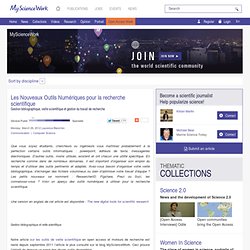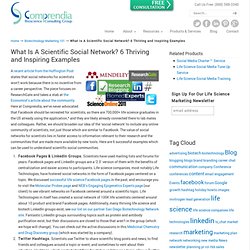

Download Our Free E-Book: Facebook Timeline for Colleges and Universities. Why should scientists use Twitter? - The Plainspoken Scientist. I have been teaching science communication workshops for scientists for over two years, and not much from those seminars is met with more skepticism than when I say Twitter can be a great tool for science outreach, even for professional development.

“Oh Twitter. Why should I waste my time with that?” , their raised eyebrows seem to say. For starters, I tell them, Twitter removes the gatekeepers (i.e., journalists) and lets you communicate your science directly to the public. It also requires less time dedication than other kinds of online outreach, such as blogging. But rather than enumerating all the reasons to use Twitter myself, I thought I would ask the scientists following our AGU account to explain how they use Twitter in 140 characters or less. Les réseaux sociaux scientifiques : différences d’approches suivant les disciplines. Twittos scientificus. Twitter, Facebook, Viadeo… sont des réseaux sociaux en pleine évolution.

Leurs récentes arrivées dans la sphère privée, les médias, les stratégies de communication, les rendent omniprésents dans nos vies. Sur les réseaux chacun gère à sa manière la séparation entre la vie privée et la vie professionnelle. Les Nouveaux Outils Numériques pour la recherche scientifique. Que vous soyez étudiants, chercheurs ou ingénieurs vous maîtrisez probablement à la perfection certains outils informatiques : powerpoint, éditeurs de texte, messageries électroniques.

D’autres outils, moins utilisés, existent et ont chacun une utilité spécifique. En recherche comme dans de nombreux domaines, il est important d’organiser son emploi du temps et d’utiliser des outils pertinents et adaptés. L’évolution de la pratique des réseaux sociaux en science. The Researcher Social Network: A Social Network Based on Metadata of Scientific Publications. Useful online tools and services for scientists, the examples are either entirely free or available in a free version. : One-click science marketing : Nature Materials. SocialMed: Social Networks for Researchers - in Primary Care, General Primary Care from MedPage Today. As more medical and science researchers take to publishing their papers in open-access journals, so too have they adopted more online collaboration in bringing those studies to fruition.

Though some social networking sites for researchers, such as ResearchGate and Academia.edu, have been around for a few years, their use appears to have hit a critical mass. Every day, researchers post questions about everything from which stem cell lines to use in a certain experiment to the best DNA sequencing technologies. Founders of these sites are quick to tout not only their role in accelerating the scientific process, but also their ability to offer a home even to negative results -- thus painting a more accurate overall portrait of the science, they claim.
ResearchGate (@ResearchGate) www.researchgate.net Founded by Berlin-based virologist and computer scientist Ijad Madisch (@IjadMadisch), ResearchGate has a Google Plus feel, with various discussions showing up on a homepage. Academia.edu (@academia) What Is A Scientific Social Network? 6 Thriving and Inspiring Examples.
A recent article from the Huffington Post states that social networks for scientists won’t work because there is no incentive from a career perspective.

The piece focuses on ResearchGate and takes a stab at the Economist’s article about the community. Here at Comprendia, we’ve never advocated that Facebook should be recreated for scientists, as there are 700,000+ life science graduates in the US already using the application,* and they are likely already connected there to lab mates and colleagues. Rather, we should broaden our idea of the ‘social network’ to include any online community of scientists, not just those which are similar to Facebook. The value of social networks for scientists lies in faster access to information relevant to their research and the communities that are made more available by new tools.
Here are 6 successful examples which can be used to understand scientific social communities. Facebook Pages & LinkedIn Groups. Scientific social network. Réseaux sociaux scientifiques.
WikiSym 2011 is open for registration and student volunteers! Jane Park, September 9th, 2011 Earlier this year, we announced that Creative Commons is an official sponsor of the 7th annual WikiSym, the International Symposium on Wikis and Open Collaboration.

WikiSym is taking place right near Creative Commons headquarters in Mountain View, CA on October 3-5 at Microsoft Research Campus in Silicon Valley. WikiSym is the premier conference on open collaboration and related technologies for researchers, industry, entrepreneurs and practitioners worldwide. It is supported by relevant organizations and companies such as Microsoft, Wikimedia Foundation, Creative Commons, the National Science Foundation, and CosmoCode. As an Associate Partner and like-minded organization concerned about the instrumental role of open content and open licenses in today’s society, Creative Commons supports WikiSym to further disseminate the goals of this forum among their audience around the world.
WikiSym 2011 registration is still open. Webinar to learn about the Learning Resource Metadata Initiative. The "social" side of digital science. Home - OpenSocial - OpenSocial Wiki. OpenSocial - It's Open. It's Social. It's up to you.